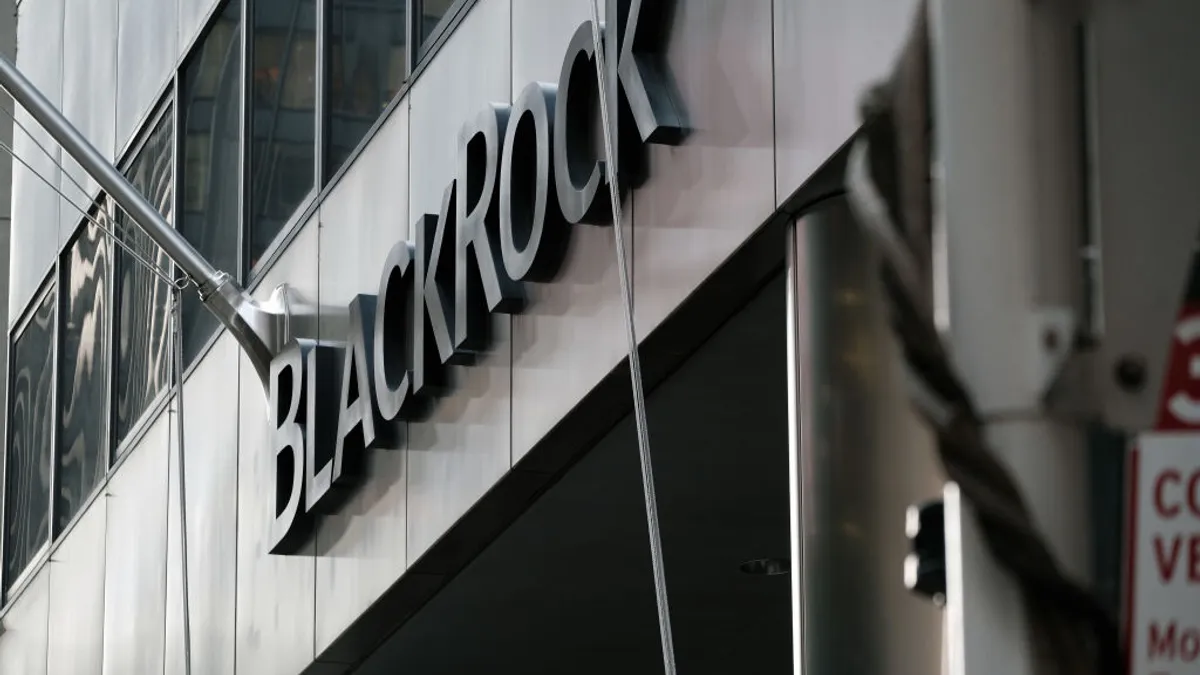Dive Brief:
- BlackRock launched a Climate Transition-Oriented Private Debt Fund last week for investors looking to invest in the transition to net-zero emissions, on the heels of shuttering a pair of ESG funds last month, according to a press release sent to ESG Dive.
- BlackRock said the fund’s management team will include sustainability and transition investment specialists, who will determine which companies it finances using a proprietary rating framework.
- The asset management firm said it will invest in companies “at a variety of stages of transitioning to net zero emissions,” giving its fund leeway to invest in a broad portfolio of companies while staying in compliance with the Securities and Exchange Commission’s updated “Names Rule.”
Dive Insight:
Despite closing down a pair of ESG-focused funds in September, the company is tapping its Global Private Debt platform to invest in the push to get to net-zero emissions.
BlackRock’s new fund will focus on mid-sized U.S. and European companies that either have goals to reduce their carbon emissions or provide climate solutions, Sonia Rocher, sustainability investing lead for the Global Private Debt platform, said in a release.
“The new fund is designed to respond to client demand for transition-oriented private debt strategies,” said Rocher, who will manage the new portfolio. “It supports [the financed companies] in their carbon reporting and achievement of their roadmap to reduce emissions.”
Net-zero investment portfolios consist of companies whose business practices and decarbonization goals generally aim to cut global greenhouse gas emissions to as near zero as possible by 2050. BlackRock said the fund comes after one of its surveys found that 98% of investors have set transition investment goals and 75% have net-zero goals for their investment portfolios.
The private debt fund is not BlackRock’s only new environmentally focused fund, according to a recent SEC filing. The company registered the “iShares Paris-Aligned Climate MSCI World ex USA ETF,” that will track investment results of an MSCI index of U.S. companies “selected and weighted so that, in the aggregate, the portfolio is compatible with the objectives of the Paris Agreement,” according to the filing.
BlackRock’s shifting of resources from ESG funds to a climate fund focused on a broad swath of the net-zero transition could provide a roadmap for investment firms looking to create sustainable investment options while complying with the updated SEC regulations.
The agency finalized amendments to the Investment Company Act’s Names Rule last month, which requires companies to invest 80% of their portfolios in funds that align with their names. The update was done, in part, due to the increase in ESG funds since it was first adopted in 2001.
An SEC spokesperson declined to comment on what that would mean for BlackRock’s new fund, but pointed to a fact sheet the agency released. The fund complies with new requirements to disclose both the definition of the terms used in its name and the requirements used to evaluate them.
SEC Chair Gary Gensler said the updates will make sure fund names align with the work they’re doing. “Such truth in advertising promotes fund integrity on behalf of fund investors,” Gensler said in the release.
The prior Names Rule was a “pretty basic low bar,” which the amended rule will start to help, according to Andrew Behar, CEO of shareholder advocacy nonprofit As You Sow. While Behar predicted some funds would simply steer away from being labeled as ESG funds, he added that it would prevent funds from claiming an ESG focus while heavily investing in oil companies.
“We’re getting into a zone now where we’re actually going to have some accuracy,” Behar said. “We’re going to get rid of that misleading information so investors can make choices based on accurate information and based on their values.”
Zoya Mirza contributed to this report














